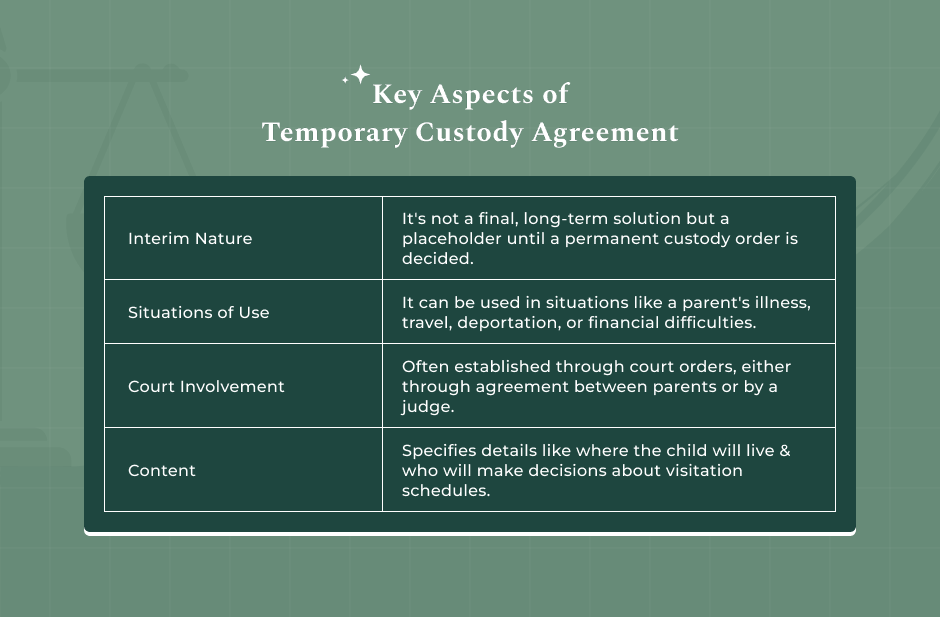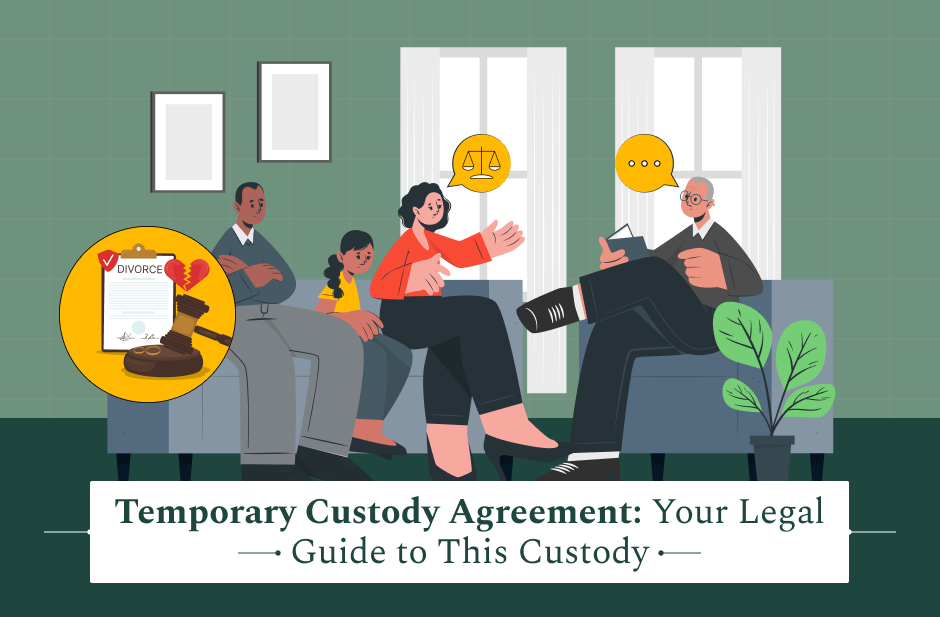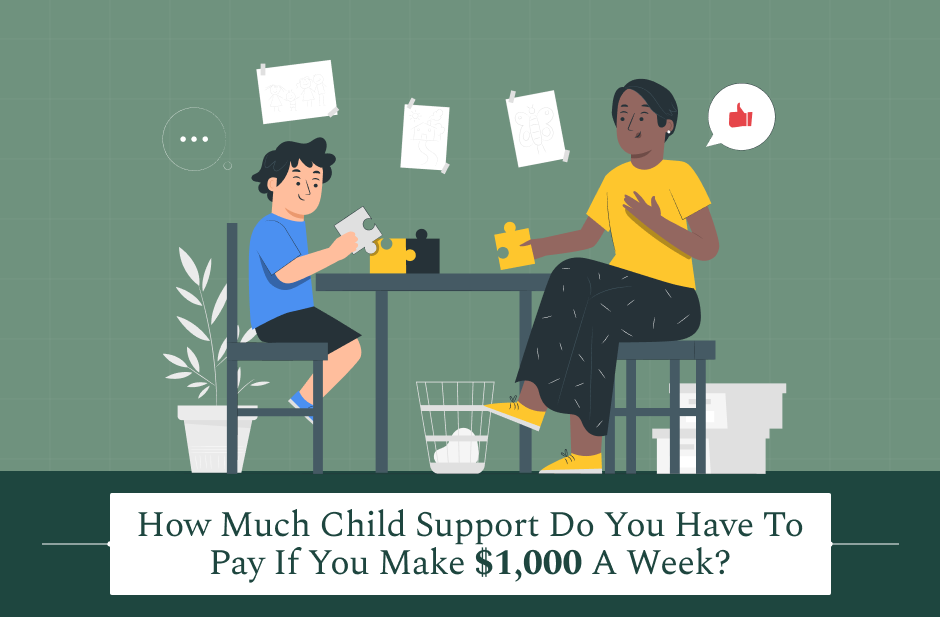So you’re trying to figure out what a temporary custody agreement actually is? Cool—you’re in the right place.
When parents split up—whether it’s a breakup, separation, or full-on divorce—one of the biggest things they need to sort out is the kids. Who’s taking care of them? Where are they gonna live? That’s where a temporary custody agreement steps in.
It’s kind of like a “pause button” plan. Not forever, just a way to keep things stable while everything else is getting figured out.
And honestly? It’s super common. Family law experts say nearly 60% of custody cases have temporary orders before the final call is made. That’s a lot of people relying on this.
So what is it, really?
A temporary custody agreement is just a legal plan that says:
- Where the child will stay for now
- Who’s making their day-to-day decisions
- And how long the arrangement will last
It’s really helpful in messy times—like when divorce papers are being filed, someone’s moving out, or there’s some kind of emergency going on. It makes sure the kid’s world doesn’t get completely turned upside down.
If this is what you were hoping to learn about, stick around. keep on reading this article till the end…
Understanding Child Custody Law

When parents go their separate ways, the law helps sort out the parenting stuff. These rules fall under something called child custody laws.
The court? Its number one priority is the child’s best interests. Every. Single. Time.
That means they’ll look at things like:
- How old the child is.
- Whether they’re healthy.
- Their emotional needs.
- Their bond with each parent.
- And who can offer them the most stability.
Ideally, the court wants parents to work together and come to an agreement. But if that doesn’t happen, a judge steps in and makes the decision for them.
Types of Child Custody
Let’s make this part simple. There are two major types of custody:
| Custody Type | What It Means |
| Legal Custody | Making the big calls—like school, doctors, and religion |
| Physical Custody | Where the kid actually lives day-to-day |
Now, each type can be:
- Sole custody – one parent is in charge
- Joint custody – both parents share the job
So, a child could live mostly with one parent (sole physical custody) but both parents still decide stuff together (joint legal custody). It really depends on what makes sense for the family.
Understanding how this all works matters—especially if you’re considering temporary custody.
Importance of Temporary Child Custody
Temporary custody is like a cushion—it helps hold things together when life gets chaotic.
When can it be useful? Oh, tons of times:
- When parents are separating
- One parent’s sick or traveling for work
- Someone moves suddenly
- Or there’s a family emergency
It prevents the whole “who’s doing what?” confusion and says clearly:
- Who the child is living with
- When they’ll visit the other parent
- Who decides on stuff like food, bedtime, school… you name it
The best part? It helps reduce the emotional rollercoaster for the kid. Which, let’s be real, is the most important thing here.
When Do You Need a Temporary Custody Order?
So, when does it make sense to ask the court for one of these?
Let’s say:
- A parent is too ill to take care of the child
- One of them gets deployed in the military
- There’s been an arrest or some legal mess
- The child’s safety is at risk
- Or one parent’s life is in major transition
In all those situations, a temporary custody order helps keep the child’s life from getting completely upended.
Sometimes parents figure this out peacefully and write up an agreement together. Other times, things get tricky and a judge needs to step in.
Remember: Every state has its own set of rules. But the one thing they all have in common? The child’s well-being comes first.
What is a Temporary Custody Agreement?

Alright, think of this as the starting point. Before anything’s official, this agreement is like a working plan for the child’s care.
It spells out:
- Where the kid’s gonna stay
- Who’s doing what
- And how it’s all going to work—for now
It’s not just for divorces, either.
Here are other times it might come into play:
- A parent is in the hospital
- They’re sent away for work or military service
- They’re in jail
- Facing deportation or some legal issue
- Or they just can’t provide financially or emotionally right now
In these cases, the other parent—or maybe a trusted grandparent or relative—can step in. And when the parent’s situation improves, they usually get custody back.
Going through the court helps make this all official, so the temporary guardian can legally handle stuff like school, doctor visits, and daily decisions while the parent’s out of the picture.
What Should You Include in a Temporary Custody Agreement?
Here’s where you want to get a little detailed. Your temporary custody agreement sets the tone for everything moving forward, so don’t skip the fine print.
| Section | What to Include |
| Visitation Schedule | Who sees the child when—including holidays |
| Physical Custody | Where the child lives during this time |
| Legal Custody | Who makes big decisions (school, health, etc.) |
| Care Instructions | Routines, doctor visits, meals, bedtime |
| Parent Rules | Behavior expectations (like no bad-mouthing each other in front of the child) |
This kind of agreement helps everyone involved—parents, judges, and most importantly, the child.
It’s also a great trial run. You get to see if things work. Maybe the schedule’s too tight or the handoffs are messy—you’ll find that out now instead of later.
It gives you the chance to fix stuff before it becomes permanent.
So yeah, this “temporary” plan? It plays a huge role in what comes next.
What Rights Come With a Temporary Custody Agreement?
When someone has temporary custody, they’re not just babysitting. They get real legal rights, like:
- Taking care of the child on a daily basis
- Deciding routines—meals, clothes, bedtime
- Making school and medical decisions
- Picking up prescriptions or going to doctor’s appointments
- Enrolling them in school or daycare
Now, the other parent usually still has visitation rights, unless the court says otherwise.
Just remember—this is all temporary. Once the final order’s made, things can change.
Can a Temporary Custody Agreement Affect the Real Family?

Oh, 100%. In fact, that happens all the time.
Judges don’t like to shake things up if something is already working. If the kid’s doing well, both parents are playing their roles, and there’s no chaos? The court may turn that temporary plan into the final custody agreement.
That’s why it’s smart to treat the temporary agreement like it might become permanent. Build it with your child’s long-term needs in mind.
Can You Change Your Temporary Custody Agreement?
Yup, for sure. Life changes. People move, jobs shift, kids grow.
Maybe:
- The schedule’s too packed
- A parent gets a new job
- Your child starts a new school or activity
You can go back to court and ask for changes. If the other parent’s on board, great. If not, you’ll just need to show why the change helps your child.
Most states have a waiting period for divorces—anywhere from 3 months to a year. That window is perfect for making sure the custody setup actually works.
Your Legal Guide: Why a Temporary Custody Agreement Matters
This isn’t just a piece of paper—it’s a real lifeline. Here’s why it matters:
- Gives your child structure when everything’s up in the air
- Keeps both parents on the same page
- Helps avoid arguments
- And helps the court figure out what’s best for the long haul
Even though it’s short-term, this agreement lays the foundation for the final custody decision.
| Purpose | Benefit |
| Provides structure | Avoids confusion and fights |
| Protects the child | Keeps them cared for and stable |
| Clarifies roles | Legal authority is clearly stated |
| Adaptable | Can be changed if life throws curveballs |
| Sets the tone | May influence final custody decision |
If you’re unsure how to write one or what to include, talk to a family law attorney. They’re there to help—and each state has its own rules, so having a pro on your side is smart.
And remember: Custody isn’t about one parent “winning.” It’s about doing what’s right for your child. A temporary custody agreement? It’s your first step toward making that happen.
Read Also:
















